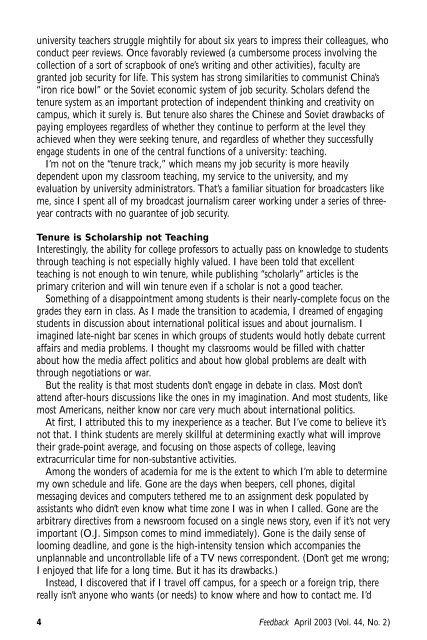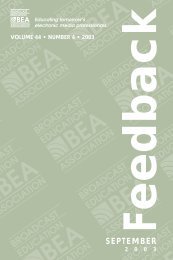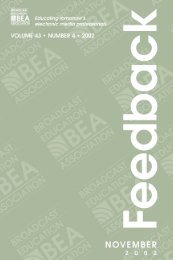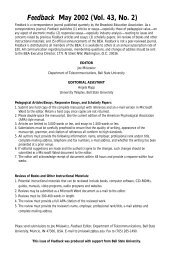APRILFeedback
Feedback April 2003 (Vol. 44, No. 2) - Broadcast Education ...
Feedback April 2003 (Vol. 44, No. 2) - Broadcast Education ...
- No tags were found...
You also want an ePaper? Increase the reach of your titles
YUMPU automatically turns print PDFs into web optimized ePapers that Google loves.
university teachers struggle mightily for about six years to impress their colleagues, whoconduct peer reviews. Once favorably reviewed (a cumbersome process involving thecollection of a sort of scrapbook of one’s writing and other activities), faculty aregranted job security for life. This system has strong similarities to communist China’s“iron rice bowl” or the Soviet economic system of job security. Scholars defend thetenure system as an important protection of independent thinking and creativity oncampus, which it surely is. But tenure also shares the Chinese and Soviet drawbacks ofpaying employees regardless of whether they continue to perform at the level theyachieved when they were seeking tenure, and regardless of whether they successfullyengage students in one of the central functions of a university: teaching.I’m not on the “tenure track,” which means my job security is more heavilydependent upon my classroom teaching, my service to the university, and myevaluation by university administrators. That’s a familiar situation for broadcasters likeme, since I spent all of my broadcast journalism career working under a series of threeyearcontracts with no guarantee of job security.Tenure is Scholarship not TeachingInterestingly, the ability for college professors to actually pass on knowledge to studentsthrough teaching is not especially highly valued. I have been told that excellentteaching is not enough to win tenure, while publishing “scholarly” articles is theprimary criterion and will win tenure even if a scholar is not a good teacher.Something of a disappointment among students is their nearly-complete focus on thegrades they earn in class. As I made the transition to academia, I dreamed of engagingstudents in discussion about international political issues and about journalism. Iimagined late-night bar scenes in which groups of students would hotly debate currentaffairs and media problems. I thought my classrooms would be filled with chatterabout how the media affect politics and about how global problems are dealt withthrough negotiations or war.But the reality is that most students don’t engage in debate in class. Most don’tattend after-hours discussions like the ones in my imagination. And most students, likemost Americans, neither know nor care very much about international politics.At first, I attributed this to my inexperience as a teacher. But I’ve come to believe it’snot that. I think students are merely skillful at determining exactly what will improvetheir grade-point average, and focusing on those aspects of college, leavingextracurricular time for non-substantive activities.Among the wonders of academia for me is the extent to which I’m able to determinemy own schedule and life. Gone are the days when beepers, cell phones, digitalmessaging devices and computers tethered me to an assignment desk populated byassistants who didn’t even know what time zone I was in when I called. Gone are thearbitrary directives from a newsroom focused on a single news story, even if it’s not veryimportant (O.J. Simpson comes to mind immediately). Gone is the daily sense oflooming deadline, and gone is the high-intensity tension which accompanies theunplannable and uncontrollable life of a TV news correspondent. (Don’t get me wrong;I enjoyed that life for a long time. But it has its drawbacks.)Instead, I discovered that if I travel off campus, for a speech or a foreign trip, therereally isn’t anyone who wants (or needs) to know where and how to contact me. I’d4Feedback April 2003 (Vol. 44, No. 2)
















